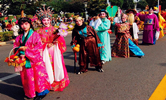
Doumen Lianzhou Di’se Street Procession
Initiated in Dasha Village of Lianzhou Town in 1941, the procession troupe impersonates the Eight Immortals, a group of legendary “xian” (immortals) in Chinese mythology. Each Immortal's power can be transferred to a power tool that can bestow life or destroy evil.T
More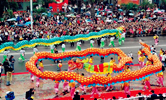
Doumen Lianzhou Dragon Dance
The Dragon Dance originated in the 5th year of the Reign of Emperor Kuang Hsu (Guangxu) in the Qing Dynasty (1636-1911) in Lianzhou Town, and later on developed into 50-m Golden and Silver dragons in Xining and Dong’an villages.
More
Baijiao Hakka Bamboo Clapper Folk Song
Ancestors of the Hakka people in Baijiao Town, Doumen District, migrated from the Central Plains to Zhuji Alley of Guangdong’s Heyuan City before they split into small groups to settle down and multiply all over South China.
More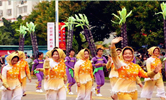 2016-12-01
2016-12-01 Flower Over-Sleeves
The handicraft also include straw hat and straw sandals handmade by Sanzao people to protect themselves in farm work.
More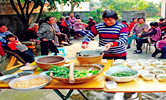 2016-12-01
2016-12-01 Hakka Salted Tea
With meat in Lei Cha removed and vegetables retained, the Salted Tea contains such main ingredients as tea leaves, peanuts, soybeans, sesame, and vegetables such as lettuce, leaf lettuce, watercress, green beans, and green onions.
More 2016-12-01
2016-12-01 Lion Dance
Featuring martial arts, dance and music, the dance existed in every village and town and won immense fame in surrounding areas.
More 2016-12-01
2016-12-01 Buddhist Boxing
More than a century ago, Shaolin monk master Yi Jiahai took his kung fu apprentice Li Huabao, who was allegedly son of Li Zicheng, to flee to Guangdong from the burning of Henan’s Shaolin Monastery by the Qing government.
More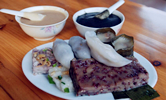 2016-12-01
2016-12-01 Tangjiawan Tea Refreshments
Introduced into Tangjiawan Town in the late Song Dynasty (960-1279), the folk Tea Refreshments refer to 36 varieties of homemade folk cakes, including Bean Fishing, Crispy Triangles, Deep-Fried Glutinous Rice Balls, Fried Sugar Rings, Fried Dumplings, Leaf-Packed Steamed Cake, Chinese Rice Pudding, Taro Cakes, and Turnip Pudding, with each dish related to a specific seasonal occasion.
More